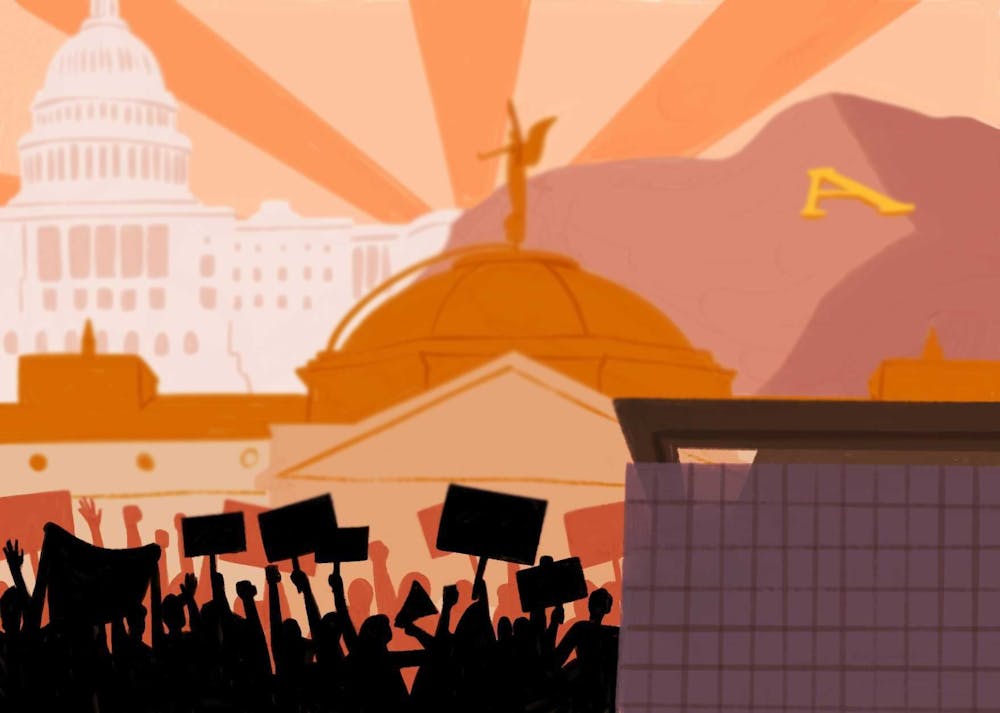While senators in Undergraduate Student Government work to pass resolutions they hope prevent mistakes from occurring next semester during the election, a large part of the process is left up to the executive branch who only recently named an elections commissioner, breaking the process laid out in the elections code for the position.
Associated Students of ASU elections are overseen by an elections commissioner who is nominated by the Council of Presidents and then confirmed by each campus senate. Each USG campus president and the elections commissioner then nominate an assistant elections commissioner to oversee elections on each campus who is approved by the corresponding senate.
The elections code outlines the position should be filled by the all-senate meeting in November, which occurred on Nov. 12. No elections commissioner was selected then, and applications were open for additional weeks.
USGT President John Hopkins said in an email the executive branch has selected a commissioner who he hopes will be confirmed by the senate during the spring semester and will complete an onboarding process. Hopkins, a senior studying finance, said the person would be named once they were cleared with human relations. Campaigning and the election typically takes place in late March.
Other changes to the election code and who will have representation in the next election were influenced by past election mistakes — senate seats have historically been left vacant because of a lack of interest, an executive ticket has assumed office despite losing the election and a senate candidate won a seat even though he had attempted to drop out of the race.
According to election code changes, there will be more polling locations, candidates will be offered an online campaign training, bribery was banned and ranked choice voting was clarified.
According to passed legislation, exploratory majors on the Tempe campus should expect senate representation.
Amendments to the election code
Agreed upon at the all-senate meeting on Nov. 12, the election code amendments include a provision specifying there should be one polling place per campus with one additional station for every 20,000 students. The Tempe campus would be the only one affected.
USGT Senate President Marco Huerta, a senior studying political science, said he supported the amendment for additional polling places in hopes they would allow more students to vote and get involved.
Historically, turnout for USG elections has been extremely low. In 2018, only 1,955 students voted in USG elections. Around 73,000 students were eligible to vote in the same year.
"If you look at our numbers of students that vote in our USG elections or ASASU elections compared to the entire student body, it usually ranges around somewhere from 5% to 10% turnout among our student body, which it can definitely be a lot better," Huerta said.
The amendments to the election code also include a provision to add a Canvas course for USG candidates to complete which outlines expectations and rules for campaigning. The addition of the Canvas course allows candidates to fulfill training requirements remotely. The previous election code only specified candidates needed to attend mandatory in-person training.
Julius Woart, a USG Polytechnic senator, sophomore studying software engineering and who co-sponsored amendments to the election code as part of a routine effort to make sure USG was prepared for the upcoming election, said he hopes the Canvas course amendment will help students work around other time commitments.
Huerta said he was unsure if the Canvas course was actually going to be created. He said the elections commissioner would likely be in charge of implementing the course as part of the campaigning routine.
The amendments also specify any attempt to bribe voters will be considered a level three violation, which immediately disqualifies candidates from seeking office.
Additional preparations to prevent repeat mistakes
USG elections utilize ranked choice voting, meaning voters rank candidates in their preferred order, rather than just selecting one ticket to win. In ranked choice voting, the ticket with the most first-choice votes wins the election. If no ticket receives a majority, the ticket with the least amount of votes is eliminated and the votes are distributed to that groups' second-choice.
Recent changes to the 2021-22 election code clarify how ballots would be tabulated after the elections commission had incorrectly defined ranked choice voting in the elections code and named the incorrect executive ticket had won during the Spring 2021 election.
"I believe we've done everything we can in the senate's jurisdiction to prepare for elections," Huerta said. "The rest of it comes up to the executive branch, the elections commissioner and any assistant elections commissioners that the elections commissioner hires."
Amanda Lombard, a senior studying public service and public policy and civic and economic thought and leadership, currently serves as the ASASU supreme court justice representing the Downtown Phoenix campus. Lombard said the court prepares for elections by reviewing the elections code and ensuring it follows ASASU's other bylaws.
"There's a bit of ambiguity and last year, the elections code changed with some pretty significant corrections, especially with how votes are tallied and decided," Lombard said. "So I'm planning on going through that again this year, just kind of revising."
Lombard said the court only looks at policy when USG requests an advisory opinion or if someone petitions a policy due to concern about it not following the elections code or bylaws.
"Because of the whole controversy and everything that surrounded the 2019-20 school year, they were asking for a lot of advice from the supreme court, to make sure everything ran smoothly last year," Lombard said. "This year, we've heard next to nothing, so I think it'll be interesting, especially like you brought to our attention, the new senate bills coming out."
Tempe representation for exploratory majors
Three senate bills passed on Nov. 16 by USGT created accommodations to open a senate seat for the University College, a school that offers exploratory programs that guide students on how to be academically successful but does not award degrees.
An exploratory program only lasts two or three semesters until the student enrolls in an ASU school from which they will earn their degree. Izaac Mansfield, a USGT senator representing the College of Global Futures, said he sponsored Senate Bill 23 to allow senate seats to be given to non-degree awarding colleges.
"Essentially University College doesn't award a degree, but then we realized Barrett probably doesn't award degrees either," said Mansfield, a junior studying innovation in society and computer information systems.
SB 29 allows students in University College to go through an appointment process instead of an election. USG bylaws state respective college councils can fill vacant senate seats. After a two-week period, the senate president can appoint a senator with the approval of the college council.
According to SB 30, the University College senate seat is exempt from the USG requirement for senators to "immediately relinquish their senate seat" if the senate "changes their respective college affiliation." A University College senator who has changed their major can keep their seat until their term is over.
Changes still in the air as the semester concludes
A bill to secure representation for colleges with 100 or more students was held for debate in the spring by USGT during its Nov. 16 meeting. The representations would have included senators for students from the College of Health Solutions and the Watts College of Public Service and Community Solutions who are located on the Tempe campus.
Another bill, that was passed and sent as an advisory opinion to the ASASU supreme court, outlined seat allocation for University College, Barrett, The Honors College and the College of Health Solutions.
USG bylaws mandate that the ASASU supreme court must conduct a seat count for next year's body by Nov. 1 and send those numbers to the elections commissioner.
Without the bill for Health Solutions and Watts representation, a bill that outlines the seat counts and an approved elections commissioner, it's unclear if students from those colleges will have representation.
Piper Hansen contributed to the writing of this article.
Correction: An earlier version of this story misidentified which group nominates the elections commissioner and was corrected Dec. 4, 2021, at 9:20 a.m.
Reach the reporters at mphughe3@asu.edu and awaiss@asu.edu and follow @MasonHu29413328 and @WaissAlexis on Twitter.
Like The State Press on Facebook and follow @statepress on Twitter.
Continue supporting student journalism and donate to The State Press today.

Alexis Waiss is an assignment editor and senior reporter, covering breaking news and writing long-form stories. Alexis worked on SP's politics desk for a year, where she reported on the Legislature, higher education policy, student government, the city of Tempe and stories highlighting social justice. She previously worked as a fellow for the Asian American Journalist Association's VOICES program.




